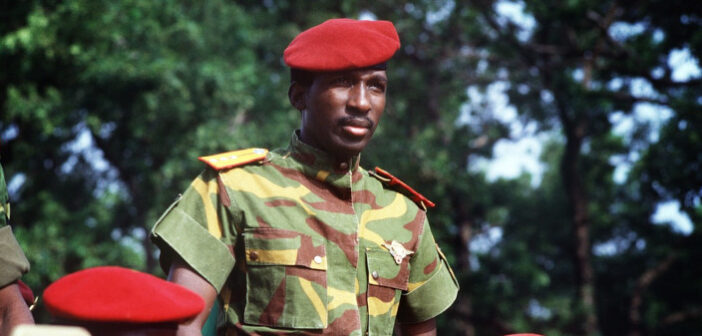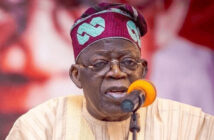More than 30 years after the assassination of the president of Burkina Faso, some of those responsible for his death have still not been punished
On August 4, 1983, Marxist revolutionary, Thomas Isidore Noël Sankara, came to power in the French Upper Volta (present-day Burkina Faso). A fighter for freedom and justice, he rejected colonial dependence, set the country on the course of economic independence and social-democratic development, and carried out innovative reforms.
During the four years of his presidency, Burkina Faso achieved record economic growth, much to the indignation of its former colonial rulers. Sankara was assassinated during a coup organized with the help of the French military. More than 30 years after this crime, many of its perpetrators have still not been punished.
Sankara’s political path
The future president was born in 1949 and was the tenth child in a Catholic family. His father, a member of the French army, was a representative of the Mossi people – the country’s largest ethnic group – and his mother was a descendant of the Fula people. Sankara’s mixed ancestry made him a “third-class” man.
As a young man, he was encouraged to become a priest, but instead chose a military career. He entered a military academy in Upper Volta and in 1970 continued his studies in Madagascar, where he graduated as an officer. In Madagascar, he became familiar with the works of Karl Marx and Vladimir Lenin, studied the basics of political science and political economy, and became interested in revolutionary ideas.
During Sankara’s time in Madagascar, the country’s authoritarian leader, Philibert Tsiranana, who maintained close ties with France and sought to strengthen ties with the West, was deposed. His overthrow made the young Sankara consider the possibility of changing the regime in his homeland.
Returning to Upper Volta two years later, Sankara was able to put his military skills into practice. He joined a unit of parachutists, and in 1974 fought against Mali when the latter laid claim to resource-rich land in the northeast of Upper Volta.
The future revolutionary then ended up in Morocco, where he met the people who would later help him come to power – Blaise Compaoré, Henri Zongo, and Jean-Baptiste Boukary Lingani. United by common revolutionary ideals, the young officers created an organization called the Communist Officers Group.
“Misfortune to those who gag the people”
In 1981, Sankara became secretary of state for information in the government of Burkinabe leader Saye Zerbo, who had come to power in a coup one year previously. However, just a year later, Sankara voluntarily left the post, speaking out against the government’s suppression of the opposition and the ban on trade unions. “Misfortune to those who gag the people!” was the slogan that accompanied Sankara’s resignation, as he denounced the government’s treatment of its people.
In early 1983, Sankara returned to government, this time as prime minister. He attended the congress of the Non-Aligned Movement, an international forum which that year was held in New Delhi. While in India, he met Fidel Castro and Samora Machel – the famous revolutionaries from Cuba and Mozambique.
Sankara’s popularity continued to grow. His eloquent speeches and condemnation of imperialism and neocolonial dependence were supported by the opposition in Ouagadougou. However, due to his reformist and radical views, which contradicted the government’s official stance, Sankara held the post of prime minister for less than six months. His removal was facilitated by the arrival of the adviser to the French president for African affairs, Jean-Christophe Mitterrand, who criticized the views of the young prime minister and threatened to impose sanctions if he continued to pursue this political course.
Sankara wasn’t just removed from public his post – he was placed under house arrest. However, after growing discontent turned into mass protests, President Jean-Baptiste Ouédraogo was forced to release him.
Sankara’s political experience convinced him that socialist ideas could not be implemented under the government of the time. In an effort to improve the lives of the people of Upper Volta, in June 1983, together with colleagues from the Communist Officers Group, he started preparing a military coup.
“No credence to this gigantic fraud of history”
On August 4, 1983, Blaise Compaoré seized the capital and announced that the country would be ruled by the National Council for the Revolution (CNR), headed by Sankara. Five days later, the officer corps attempted a counter-coup, which was suppressed by the CNR. A new government was formed, which included representatives of national communist associations.
Sankara’s main goal was to transform the state structure. The formation of a socialist society and the development of the country’s economic independence were among the new government’s main priorities.
In order to break ties with the colonial past, the country’s name was changed in August 1984. Upper Volta became known as Burkina Faso, which in the Mooré and Dyula languages means “the country of honest people.” The new socialist government also changed the state symbols. The red on the flag symbolized the blood spilled by the revolutionaries and the many sacrifices of the people of Burkina Faso, the green stood for the abundance of agricultural riches, and the yellow-green star reflected the guiding ideology of the revolution.
On October 4, 1984, Sankara delivered a speech titled “Freedom Can Be Won Only Through Struggle” at the 39th Session of the UN General Assembly in New York. He said Burkina Faso would not become an ally of the Western or Eastern blocs, and intended to develop partnerships with other developing countries in Africa, Asia, and Latin America. He also spoke of his intention to carry out economic reforms without foreign involvement, and refused economic assistance from the International Monetary Fund (IMF), the World Bank, and France.
“We place ourselves within this world, while giving no credence to this gigantic fraud of history nor accepting the status of the ‘hinterland of the satiated West’. We do so to affirm our awareness of belonging to a tricontinental whole and to acknowledge as a Nonaligned country and with the full depth of our convictions that a special solidarity unites the three continents of Asia, Latin America, and Africa in a single struggle against the same political gangsters and the same economic exploiters,” Sankara declared.
“Look at your plates when you eat”
Sankara launched large-scale reforms aimed at helping the country’s poor, who made up the majority of the population. The measures covered all aspects of public life, including the economy, education, and the rights of women and children. To strengthen the socialist system, new executive bodies and Committees for the Defense of the Revolution (CDRs) were formed, and a youth organization called The Pioneers of the Revolution was created.
Sankara sought to establish an economy that would not depend on foreign imports. “Many people ask, ‘Where is imperialism?’ Look at your plates when you eat. These imported grains of rice, corn, and millet – that is imperialism,” he said. To achieve this goal, it was necessary to develop domestic production. “The CDRs are there to produce” became one of the slogans of the new economic policy.
Sankara focused on the development of the agricultural sector in order to prevent food shortages in Burkina Faso’s arid climate. He strived to improve agricultural infrastructure instead of focusing on industrialization, which for him was synonymous with imperialism. To help peasants, he introduced economic measures such as the agrarian reform (which included the redistribution of land, reduced land fees, and new cooperatives), and new pricing and tax policies. The government also introduced a state program for the local distribution of grain, and limited the private selling of food products – measures that reduced the country’s dependence on imports from the neighboring Ivory Coast.
His government’s social policy included the construction of public housing (known as “the cities of August 4th”) in place of slums, reduced rent, and literacy campaigns. The healthcare system was also expanded – the government initiated the vaccination of over 2.5 million children, helping reduce child mortality, and brought medical services to villages. Under Sankara, the rights of women and men were equalized, and female circumcision, forced marriage, and polygamy were prohibited. For the first time in the country’s history, women were appointed to top government positions.
The fight against corruption was a significant policy of the National Council for the Revolution, and every official was obliged to provide information on their income. There was even a radio show where people could describe cases of corruption.
The reforms allowed the country to achieve the highest per capita GDP growth rate in its entire history. However, the CNR simply did not have enough time to solve all the social and economic problems.
Burkina Faso’s successful social reforms and its steadfast refusal to receive foreign aid caused concern in France and the neighboring African nations dependent on the former metropole. In 1986, at the initiative of the French government, a conference was held in the city of Yamoussoukro in the Ivory Coast. The meeting, which was attended by the leaders of neighboring countries, demanded that Sankara cease his reformist activities.
“You cannot kill ideas”
On October 15, 1987, at the age of 37, Sankara was assassinated in a coup organized by the same Blaise Compaoré who had helped him come to power. The overthrow of the socialist president was explained by the fact that his policy had jeopardized relations with the Ivory Coast and France.
Vasily Filippov, who holds a Ph.D. in history and is a leading researcher at the Centre for Tropical African Studies at the Institute for African Studies of the Russian Academy of Sciences, wrote an article titled “The African Policy of Francois Mitterrand”. In the paper, he described Sankara’s assassination as “one of Jean-Christophe Mitterrand’s dirtiest tricks.”
The historian notes that Sankara’s reforms were undone “under the vigilant control of France and with its direct participation.” Despite the fact that the government was overthrown in an unconstitutional way, Paris assessed the events as “democratization processes” and legitimized Compaoré’s rule. In 2001, the former coup leader was recognized as “France’s closest friend” in West Africa.
A series of revolts have shaken Upper Volta since it gained independence, but Sankara remains the only leader to have been assassinated. Unlike Sankara, the country’s previous leaders pursued a conservative policy, remaining indifferent to the woes of the people and maintaining strong ties with their former colonial rulers.
In 2015, the former leader’s widow, Mariam Sankara, accused France of organizing the assassination and demanded that the government provide documents connected to the period of Sankara’s presidency and the events of 1987. Two years later, French President Emmanuel Macron promised to declassify the information and three archives were transferred to Burkina Faso.
Among the papers was a protocol dated October 16, 1987, published by the French newspaper L’Humanité in April 2021. It confirmed the French military’s involvement in organizing and carrying out Sankara’s assassination.
In the fall of 2021, the Burkina Faso government held a trial on Sankara’s murder. In the spring of the following year, Compaoré, who had been in power for 27 years, was sentenced to life in prison. So far, however, only representatives of Burkina Faso have been convicted.
In 2022, military officer Ibrahim Traoré came to power. Burkina Faso’s new council of ministers officially proclaimed Sankara a national hero and October 15 was declared a national day of remembrance. The government also plans to build a mausoleum at the site of his assassination, while Charles de Gaulle Boulevard, located next to the memorial, was renamed in honor of the deceased president.
Sankara became a symbol of the Burkina Faso revolution and the struggle for justice. He is often called “Africa’s Che Guevara” and “the most honest president” for striving to help everyday people. Thirty-six years after his death, he remains popular and symbolizes the fight for change. The independent course he set is a legacy supported by Burkina Faso’s current government, which – just like Sankara – opposes cooperation with its former colonial rulers.
By Daria Sukhova, Research intern of the Centre for African Studies, HSE University. This article originally appeared on RT.com




